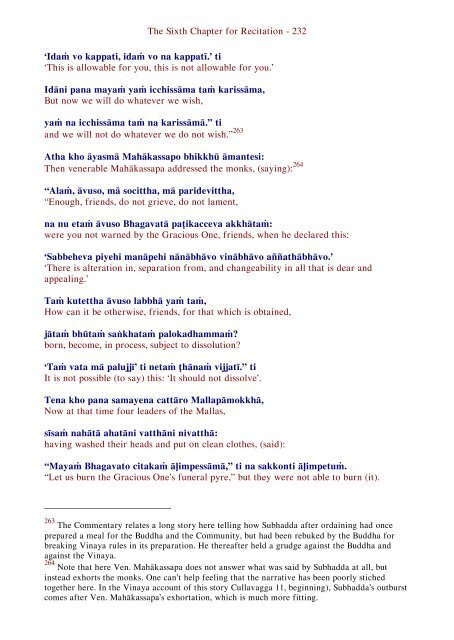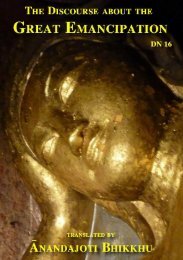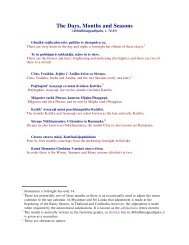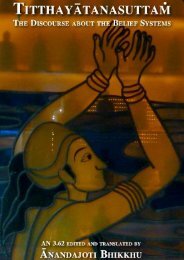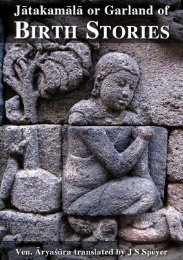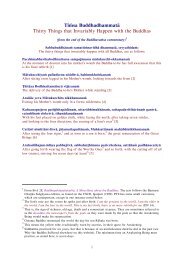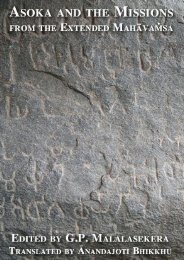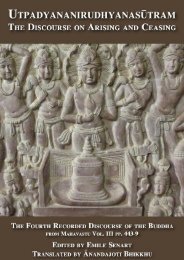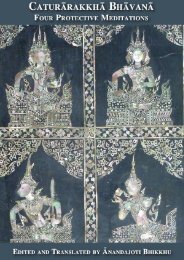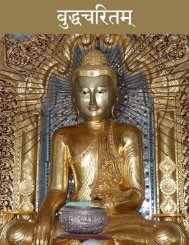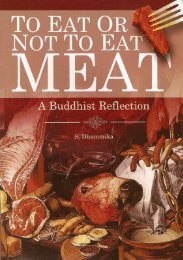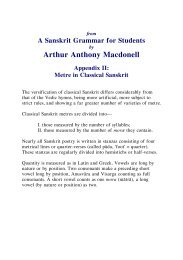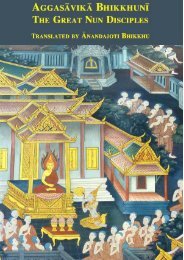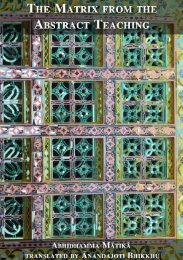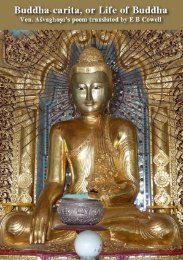Mahaparinibbanasuttam (DN 16) - Ancient Buddhist Texts
Mahaparinibbanasuttam (DN 16) - Ancient Buddhist Texts
Mahaparinibbanasuttam (DN 16) - Ancient Buddhist Texts
Create successful ePaper yourself
Turn your PDF publications into a flip-book with our unique Google optimized e-Paper software.
The Sixth Chapter for Recitation - 232<br />
‘Idaṁ vo kappati, idaṁ vo na kappatī.’ ti<br />
‘This is allowable for you, this is not allowable for you.’<br />
Idāni pana mayaṁ yaṁ icchissāma taṁ karissāma,<br />
But now we will do whatever we wish,<br />
yaṁ na icchissāma taṁ na karissāmā.” ti<br />
and we will not do whatever we do not wish.” 263<br />
Atha kho āyasmā Mahākassapo bhikkhū āmantesi:<br />
Then venerable Mahākassapa addressed the monks, (saying): 264<br />
“Alaṁ, āvuso, mā socittha, mā paridevittha,<br />
“Enough, friends, do not grieve, do not lament,<br />
na nu etaṁ āvuso Bhagavatā paṭikacceva akkhātaṁ:<br />
were you not warned by the Gracious One, friends, when he declared this:<br />
‘Sabbeheva piyehi manāpehi nānābhāvo vinābhāvo aññathābhāvo.’<br />
‘There is alteration in, separation from, and changeability in all that is dear and<br />
appealing.’<br />
Taṁ kutettha āvuso labbhā yaṁ taṁ,<br />
How can it be otherwise, friends, for that which is obtained,<br />
jātaṁ bhūtaṁ saṅkhataṁ palokadhammaṁ?<br />
born, become, in process, subject to dissolution?<br />
‘Taṁ vata mā palujjī’ ti netaṁ ṭhānaṁ vijjatī.” ti<br />
It is not possible (to say) this: ‘It should not dissolve’.<br />
Tena kho pana samayena cattāro Mallapāmokkhā,<br />
Now at that time four leaders of the Mallas,<br />
sīsaṁ nahātā ahatāni vatthāni nivatthā:<br />
having washed their heads and put on clean clothes, (said):<br />
“Mayaṁ Bhagavato citakaṁ āḷimpessāmā,” ti na sakkonti āḷimpetuṁ.<br />
“Let us burn the Gracious One’s funeral pyre,” but they were not able to burn (it).<br />
263 The Commentary relates a long story here telling how Subhadda after ordaining had once<br />
prepared a meal for the Buddha and the Community, but had been rebuked by the Buddha for<br />
breaking Vinaya rules in its preparation. He thereafter held a grudge against the Buddha and<br />
against the Vinaya.<br />
264 Note that here Ven. Mahākassapa does not answer what was said by Subhadda at all, but<br />
instead exhorts the monks. One can’t help feeling that the narrative has been poorly stiched<br />
together here. In the Vinaya account of this story Cullavagga 11, beginning), Subhadda’s outburst<br />
comes after Ven. Mahākassapa’s exhortation, which is much more fitting.


